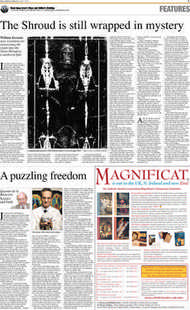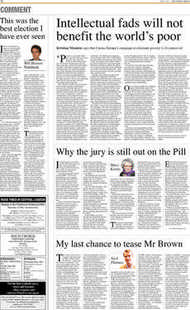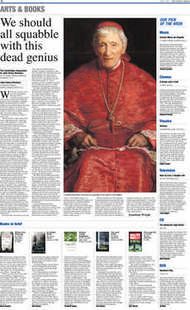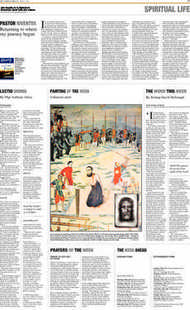Page 13, 7th May 2010
Page 13
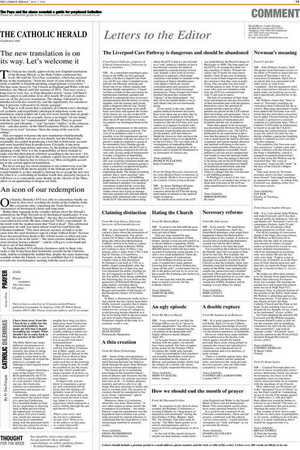
Report an error
Noticed an error on this page?If you've noticed an error in this article please click here to report it.
Tags
Share
Related articles
A Dependable Pathway To The Life Beyond
Don’t Lose The Link
Doctor: Unofficial Euthanasia ‘widely Practised’
The Cardinal Is Right To Use Attention-grabbing Slogans
Don’t Dismiss The Liverpool Care Pathway
Professor Attacked Over Faith
The Liverpool Care Pathway is dangerous and should be abandoned
From Patrick Pullicino, professor of Clinical Neurosciences, University of Kent, Canterbury SIR – As a consultant neurologist practising in the NHS, my first personal contact with the Liverpool Care Pathway (LCP) was when I rounded on my patients one Monday morning and found one of my elderly patients had become deeply unresponsive. I found out that a couple of days previously he had become confused, agitated and difficult to manage because of seizures and pneumonia and the doctor covering together with the nursing staff jointly made a diagnosis that he was “dying”. Despite the fact that none of his problems were fatal, and against the wishes of his family, he was put on the LCP. Against considerable opposition I withdrew the LCP and within two weeks my patient was discharged home to his wife.
Despite protestations to the contrary, the LCP is a euthanasia pathway. The crux of its problem is that it is not possible, even for experienced specialists, to determine with any accuracy if a person’s medical condition is going to be imminently fatal. Despite paying lip-service to this fact, the LCP uses a consensus group composed of individuals with varying medical backgrounds to make a diagnosis of impending death. Since there is no proven scientific way to predict imminent death, the decision of the LCP consensus group is more a consensus on perceived quality of life than on the likelihood of impending death. The danger of putting patients into a “poor outcome” category is that it leads to self-fulfilling prophesies. In a recent hospital medical staff meeting I attended, two medical consultants expressed the views that pressure to find empty beds and difficulties nurses face trying to manage and treat agitated and confused elderly patients both influenced who was put on the LCP. The most insidious thing about the LCP is that it is put forward as a “care” pathway whereas in fact it has become a licence for medical personnel to suspend normal clinical care. Instead, a new kind of reversemedicine is imposed, which treats confusion with sedatives (instead of the avoidance of these), breathlessness with opiates (which are usually contraindicated) and secretions with atropinic agents (which encourage pneumonia). These changes have been justified because they restore the “dignity” of the dying patient – but they do in fact hasten death, even in individuals who are not imminently dying.
To my mind, in the sick, elderly patient medical treatment decisions have to be taken one at a time, day by day, and each weighed up for their potential benefit or harm to the patient. A pathway like the LCP may give reassurance as it appears to restore calm and control in a situation that is often confused, unpredictable and stressful for the patient, staff and relatives. Medicine, however, does not have the right to reduce dying to an algorithm, as the LCP does. The very high risk of misdiagnosis of impending death, makes this pathway dangerous. In its current state it should be abandoned as an instrument of clinical care.
Yours faithfully, PATRICK PULLICINO Kent, Canterbury From Dr Philip Howard, chairman of the Joint Medical Ethics Committee of the Catholic Medical Association and the Catholic Union of Great Britain SIR – Fr James Mulligan (Feature, April 23) was right to highlight concerns about the LCP for the dying, particularly in relation to the spiritual needs of patients.
The results of an audit of the LCP was published by the Royal College of Physicians in 2009. The time spent on the LCP is on average less than two days (median 33 hours: 30 hours for cancer and 35 hours for non-cancer deaths). Only 50 per cent of patients were aware of their diagnosis and 40 per cent knew that they were actually dying. The care plan was discussed with the patient in only 30 per cent of cases who were not comatose at the time the LCP was commenced and with 72 per cent of carers.
The lack of awareness of their diagnosis and prognosis and any discussion of their treatment plan with the patients themselves raises the question of consent and the extent to which patients are placed on the LCP without their knowledge and agreement. This is particularly important in relation to the discontinuation of medication and hydration and the use of sedatives.
There does appear to be an increasing disconnection between the LCP and traditional palliative care. The LCP is predicated on an expectation or decision that the patient is dying. Palliative care is based upon the need to alleviate symptoms and restore mental, physical and spiritual well-being to the maximum extent possible when cure is no longer appropriate or possible. Good palliative care has always emphasised and sought to meet the spiritual needs of patients. Once the patient is deemed to be dying and on the LCP there may be an increased expectation on behalf of healthcare professionals and relatives that the patient will soon die. There is a danger that this will become a self-fulfilling prophecy.
Fr Mulligan is correct in his view that the LCP is not perfect but wrong to think that criticisms of the LCP are either uninformed or without foundation.
Yours faithfully, PHILIP HOWARD By email
blog comments powered by Disqus










